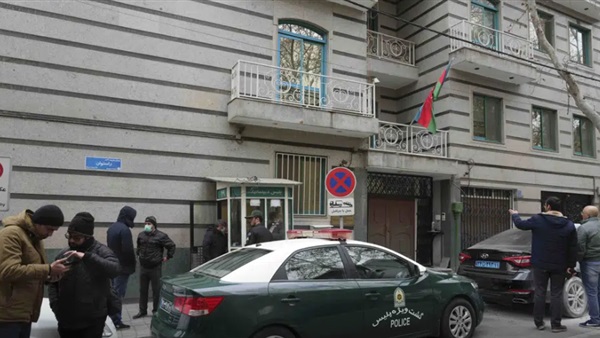Fatal shooting at Azerbaijan Embassy in Iran raises tensions

A gunman stormed the Azerbaijan Embassy in Iran’s capital
Friday, killing its security chief and wounding two guards in an attack that
spiked long-simmering tensions between the two neighboring countries.
Azerbaijan’s Foreign Ministry said it would evacuate the
diplomatic post, accusing Iran of not taking reported threats against it
seriously in the past that include inciting comments in hard-line media over
Azerbaijan’s diplomatic ties to Israel.
Tehran’s police chief, Gen. Hossein Rahimi, initially blamed
the attack on “personal and family problems,” something quickly repeated across
Iranian state media. But within hours Rahimi would lose his position as police
chief after footage emerged that appeared to show a security force member doing
nothing to stop the attack.
“Previously, there have been attempts to threaten our
diplomatic mission in Iran, and it was constantly raised before Iran to take
measures to prevent such cases, and to ensure the safety of our diplomatic
missions,” the Azerbaijan Foreign Ministry said. “Unfortunately, the last
bloody terror attack demonstrates the serious consequences of not showing
proper sensitivity to our urgent appeals in this direction.”
“We are of the
opinion that the recent anti-Azerbaijani campaign against our country in Iran
led to such attack against our diplomatic mission,” the ministry added.
Azerbaijan President Ilham Aliyev called the assault a
“terrorist attack.” He identified the dead security chief as 1st Lt. Orkhan
Rizvan Oglu Askarov.
“We demand that this terrorist act be swiftly investigated
and the terrorists punished,” Aliyev said in a statement. “Terror against
diplomatic missions is unacceptable!”
The attack happened Friday morning, the second day of the
Iranian weekend. Surveillance video released in Azerbaijan purportedly showed
the gunman arriving by car at the embassy, running into the back of another car
parked out front. He exited his car, holding what appeared to be a
Kalashnikov-style rifle.
From there, details immediately conflict with the Iranian
account of the attack.
Iranian state TV had quoted Rahimi as saying the gunman had
entered the embassy with his two children during the attack. However,
surveillance footage from inside the embassy, which matched details of the
aftermath and bore a timestamp matching the Azerbaijan Foreign Ministry’s
statement, showed the gunman burst through the embassy’s doors alone.
Those inside tried to push through metal detectors to take
cover. The man opens fire with the rifle, its muzzle flashing, as he chases
after the men into the small side office. Another man bursts from a side door
and fights the gunman for the rifle as the footage ends.
Another surveillance video from outside the embassy, which
also corresponded to the same details, showed the gunman slam his car into
another in front of the embassy. The gunman then got out and leveled his rifle
at a figure inside of the Iranian police stand, likely a security force member,
who stood still and did nothing as the man stormed the embassy.
Video of the aftermath showed an empty diplomatic police
post just near the embassy, with one man apparently wounded in an SUV parked
outside. Inside the embassy past a metal detector, paramedics stood over what
appeared to be a lifeless body in a small office as blood pooled on the floor
beneath.
Associated Press journalists later saw the embassy’s front
door pocked with bullet holes after the attack.
Iranian prosecutor Mohammad Shahriari reportedly said the
gunman’s wife had disappeared in April after a visit to the embassy. The
Iranian judiciary’s Mizan news agency quoted Shahriari as saying the gunman
believed his wife was still in the diplomatic post at the time of the attack —
even though it was some eight months later.
Iran’s Foreign Ministry spokesman Nasser Kanaani also said
his country strongly condemned the attack, which was under investigation with
“high priority and sensitivity.” Azerbaijan also summoned Iran’s ambassador
there to lodge a protest over the attack as authorities replaced Rahimi,
Tehran’s police chief, without offering an explanation.
Azerbaijan borders Iran’s northwest and belonged to the
Persian Empire until the early 19th century. Ethnic Azeris also number over 12
million people in Iran and represent the Islamic Republic’s largest minority
group — making maintaining good relations even more important for Tehran.
There have been tensions between the two countries as
Azerbaijan and Armenia have fought over the Nagorno-Karabakh region. Iran also
wants to maintain its 44-kilometer (27-mile) border with landlocked Armenia —
something that could be threatened if Azerbaijan seizes new territory through
warfare.
Iran in October launched a military exercise near the
Azerbaijan border, flexing its martial might amid the nationwide protests
rocking the Islamic Republic. Azerbaijan also maintains close ties to Israel,
which Tehran views as its top regional enemy. The Islamic Republic and Israel
are locked in an ongoing shadow war as Iran’s nuclear program rapidly enriches
uranium closer than ever to weapons-grade levels. Israel also offered its
condolences to Azerbaijan over the attack.
Turkey, which has close ties to Azerbaijan, condemned the
attack, called for the perpetrators to be brought to justice and for measures
to be put in place to prevent similar attacks in the future. Turkey has backed
Azerbaijan against Armenia over Nagorno-Karabakh.
“Turkey, which has been subjected to similar attacks in the
past, deeply shares the pain of the Azerbaijani people,” a Turkish Foreign
Ministry statement said. “Brotherly Azerbaijan is not alone. Our support to
Azerbaijan will continue without interruption, as it always has.”







